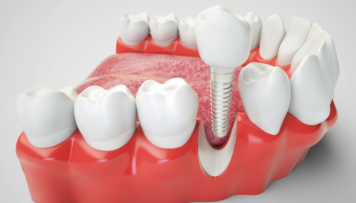Dental Implants
Dental implants are a popular and effective solution for replacing missing teeth. They are artificial tooth roots that are surgically placed into the jawbone to support a dental crown or bridge. Implants look and function like natural teeth and can last a lifetime with proper care. The implant procedure typically involves multiple visits over several months and requires good oral hygiene habits to maintain the health of the implant and surrounding teeth and gums. Dental implants are a versatile and long-lasting option for restoring a healthy and beautiful smile.

Several factors can contribute to the need for dental implants, including:
- Missing teeth due to injury or decay
- Gum disease or tooth decay leading to tooth loss
- Congenital defects or abnormalities
- Aging leading to loss of teeth or bone density in the jaw
- Failed root canal or bridgework
Dental implants are a popular and effective solution for replacing missing teeth, and can improve both the functionality and appearance of the teeth and mouth.
If there's anything you'd like to know more about, just let us know - we're always happy to provide additional information
Fill the details will get back to you shortly...

Dental implants are typically made of titanium, a biocompatible material that is well-tolerated by the body.
The process for getting dental implants typically involves multiple visits over several months, including a consultation, implant placement surgery, and placement of the artificial tooth or teeth.
The length of the dental implant process varies depending on the individual case, but it can take months from start to finish.
The dental implant procedure is typically done under local anesthesia, so patients should not feel any pain during the procedure. Some discomfort and swelling may occur after the procedure, but this can be managed with over-the-counter pain medication.
Dental implants can last a lifetime with proper care, including good oral hygiene habits and regular dental checkups.
The cost of dental implants can vary depending on the individual case, including the number of implants needed and any additional procedures required. Many dental insurance plans do not cover the cost of dental implants, but some may offer partial coverage.
Some dental practices offer same-day dental implant procedures, also known as immediate load implants, which allow patients to receive a fully functional implant-supported restoration in a single appointment.
As with any surgical procedure, there are risks and potential complications associated with dental implants, including infection, implant failure, and damage to surrounding teeth or structures.
Dental implants are surgically placed into the jawbone to replace the root of a missing tooth, while dentures are removable appliances that replace multiple missing teeth.
Proper care of dental implants includes regular brushing and flossing, avoiding hard or sticky foods, and attending regular dental checkups and cleanings
Proper post-treatment care is important to ensure the success of dental implant surgery. Here are some tips for caring for dental implants after the procedure:
- Practice good oral hygiene: Brush and floss your teeth regularly to keep your mouth clean and free of plaque and bacteria. Use a soft-bristled toothbrush and a non-abrasive toothpaste to avoid damaging the implant or surrounding teeth.
- Avoid hard or sticky foods: In the days following the procedure, stick to soft, nutritious foods that are easy to chew and won't damage the implant.
- Use a saltwater rinse: Rinse your mouth with saltwater several times a day to reduce swelling and promote healing.
- Take pain medication as directed: If you experience pain or discomfort after the procedure, take over-the-counter pain medication as directed by your dentist.
- Attend follow-up appointments: Schedule and attend follow-up appointments with your dentist to monitor the healing process and ensure the implant is properly integrating with the surrounding bone and tissue.
- Avoid smoking: Smoking can impede the healing process and increase the risk of implant failure. If you smoke, consider quitting or at least cutting back while your implants heal.
- Wear a nightguard: If you grind or clench your teeth, wearing a nightguard can help protect your implants and prevent damage to surrounding teeth.
Following these post-treatment care guidelines can help ensure the long-term success of your dental implants and improve your oral health and overall well-being.

Working Hours
Monday - Saturday : 10:30 AM - 7:00 PM
Thursday: Holiday
Sunday: 10:30 AM - 1:00 PM
Call Us
+91 91081 24151
+91 99001 14151
Mail Us
happytohelp@vatsandparam.com